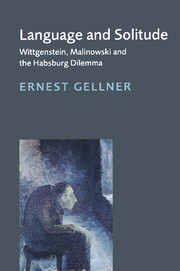Book contents
- Frontmatter
- Contents
- Preface
- Foreword
- Part I The Habsburg dilemma
- Part II Wittgenstein
- 10 The loneliness of the long-distance empiricist
- 11 The poem to solitude, or: confessions of a transcendental ego who is also a Viennese Jew
- 12 Ego and language
- 13 The world as solitary vice
- 14 The mystical
- 15 The central proposition of the Tractatus: world without culture
- 16 Wittgenstein mark 2
- 17 Tertium non datur
- 18 Joint escape
- 19 Janik and Toulmin: a critique
- 20 The case of the disappearing self
- 21 Pariah communalism
- 22 Iron cage Kafka-style
- Part III Malinowski
- Part IV Influences
- Part V Conclusions
- General bibliography
- Bibliographies of Ernest Gellner's writings on Wittgenstein, Malinowski, and nationalism
- Index
18 - Joint escape
Published online by Cambridge University Press: 05 March 2010
- Frontmatter
- Contents
- Preface
- Foreword
- Part I The Habsburg dilemma
- Part II Wittgenstein
- 10 The loneliness of the long-distance empiricist
- 11 The poem to solitude, or: confessions of a transcendental ego who is also a Viennese Jew
- 12 Ego and language
- 13 The world as solitary vice
- 14 The mystical
- 15 The central proposition of the Tractatus: world without culture
- 16 Wittgenstein mark 2
- 17 Tertium non datur
- 18 Joint escape
- 19 Janik and Toulmin: a critique
- 20 The case of the disappearing self
- 21 Pariah communalism
- 22 Iron cage Kafka-style
- Part III Malinowski
- Part IV Influences
- Part V Conclusions
- General bibliography
- Bibliographies of Ernest Gellner's writings on Wittgenstein, Malinowski, and nationalism
- Index
Summary
As stressed, the Wittgensteinian vision, as born in his bosom in the Viennese context, had deep populist roots. The underlying assumption, profoundly built into the Viennese world, was that man really had but two options in this world: either to become one of the individualist, universal, free-floating, cultivated haute bourgeoisie, with its distaste for the cousin-infested ethnic newcomers, who were both an enemy and a painful, humiliating reminder of its own parvenu origins – or to embrace one of the ethnic cultures, ‘forms of life’, and treat its voice as ultimate and authoritative. You could be liberal or nationalist. Strictly speaking, there were people seeking a third option, which would preserve the wider and liberal state and at the same time satisfy the nationalist craving. Perhaps one could turn nations into non-territorial cultural associations, which would leave the political and economic order to a non-ethnic central agency … Perhaps, let us hope so, mankind will yet turn to such an option, because the alternatives to it are horrible to contemplate. But, in Central Europe as it actually was during the earlier parts of this century, this – alas – persuaded few people. The third way was not followed. Tertium non datur, it seemed.
In his youth Wittgenstein fought rather bravely, and with a strange appropriateness which I am sure he never perceived, for the Habsburg Empire. He was a soldier of that non-ethnic empire, and in the intervals of fighting he worked out, with great conceptual frugality and economy, the structure of a world as it might appear to a culture-free individualist. The Empire was about to succumb to the onslaught and intrigues of the nationalists.
- Type
- Chapter
- Information
- Language and SolitudeWittgenstein, Malinowski and the Habsburg Dilemma, pp. 79 - 84Publisher: Cambridge University PressPrint publication year: 1998



